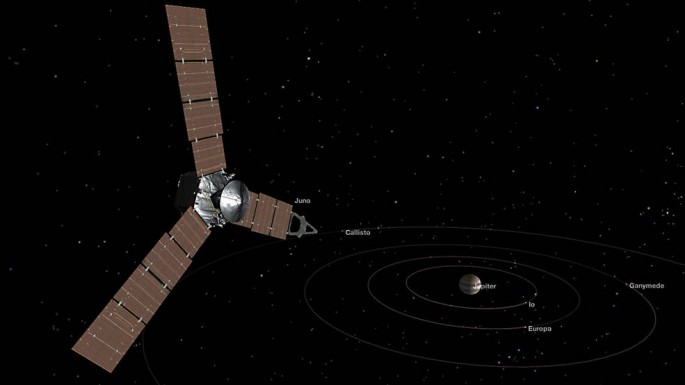Today, July 4, NASA's Juno spacecraft will enter one of the most dangerous atmospheres in the solar system, in Jupiter's highly irradiated, thick atmosphere.
Tonight, Juno will be captured by Jupiter's strong gravitational forces, where the probe will be placed into the gas giant's orbit, colliding with highly charged particles and moving at rapid speeds in the planet's powerful and massive magnetic field.
According to Juno mission's Heidi Becker, who is a senior Engineer of Radiation Effects Group of NASA's Jet Propulsion Laboratory, when these electrons smash into the spacecraft, they will all bounce off and release huge amounts of energy that create secondary photons or light particles that will ricochet. This is akin to a spray of radiation bullets, she adds.
Apart from this dangerous, intense entry into Jupiter's magnetosphere, Juno will need to suffer through this continuous exposure to these radiation bullets for 1.5 years, as it completes 37 orbits of the planet. Upon completion, Juno will plunge into the planet's inner atmosphere on February 2018 to prevent the probe from contaminating Jupiter's moon, Europa with Earth microbes, since the moon may already host alien life.
The Juno mission team will now keep the spacecraft from being fried with this powerful atmospheric radiation, by maneuvering the spacecraft far away as possible from Jupiter's intense radiation belts.
In order to protect itself from this type of radiation, Juno is covered in a 400 pound, 1.75 centimeter thick titanium suit that should be able to lower radiation from seeping through the probe's digital components including its suite of scientific instruments inside by 800 times.
Becker says that without this kind of protection, the noise emitted from radiation penetrating through would be too high to view the stars, which means that we would not determine what direction Juno is pointing.
When everything goes as planned, Juno should be provided with enough protection to withstand the duration of this mission since the probe will be mapping out gravitational fields along with magnetic fields of the gas planet, where it will also finally determine the composition of its surface and inner core.
Becker adds, Jupiter possesses the most intense and dangerous radiation environments in any planet in the solar system, as Juno will be the first spacecraft to fully explore these harshest and unknown conditions.



























